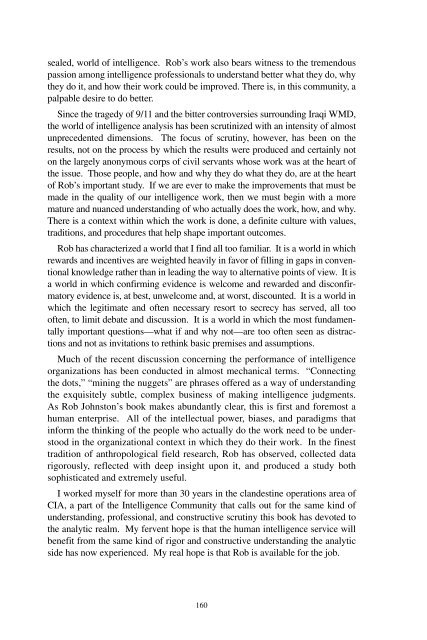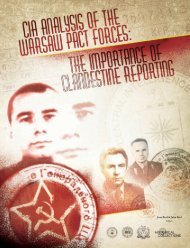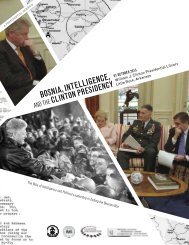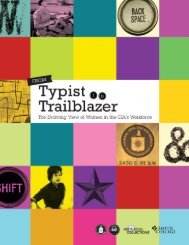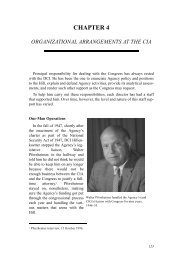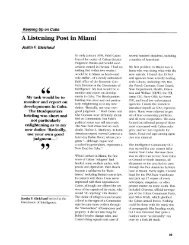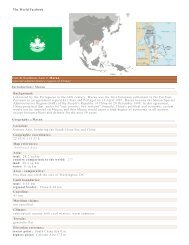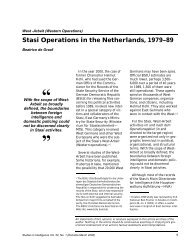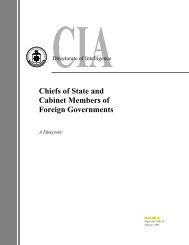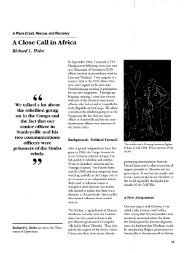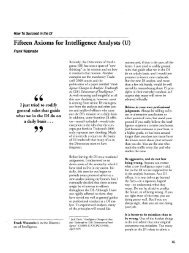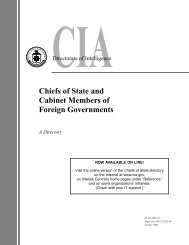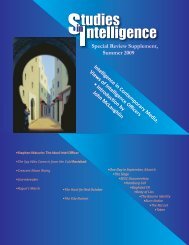Analytic Culture in the U.S. Intelligence Community (PDF) - CIA
Analytic Culture in the U.S. Intelligence Community (PDF) - CIA
Analytic Culture in the U.S. Intelligence Community (PDF) - CIA
Create successful ePaper yourself
Turn your PDF publications into a flip-book with our unique Google optimized e-Paper software.
sealed, world of <strong>in</strong>telligence. Rob’s work also bears witness to <strong>the</strong> tremendous<br />
passion among <strong>in</strong>telligence professionals to understand better what <strong>the</strong>y do, why<br />
<strong>the</strong>y do it, and how <strong>the</strong>ir work could be improved. There is, <strong>in</strong> this community, a<br />
palpable desire to do better.<br />
S<strong>in</strong>ce <strong>the</strong> tragedy of 9/11 and <strong>the</strong> bitter controversies surround<strong>in</strong>g Iraqi WMD,<br />
<strong>the</strong> world of <strong>in</strong>telligence analysis has been scrut<strong>in</strong>ized with an <strong>in</strong>tensity of almost<br />
unprecedented dimensions. The focus of scrut<strong>in</strong>y, however, has been on <strong>the</strong><br />
results, not on <strong>the</strong> process by which <strong>the</strong> results were produced and certa<strong>in</strong>ly not<br />
on <strong>the</strong> largely anonymous corps of civil servants whose work was at <strong>the</strong> heart of<br />
<strong>the</strong> issue. Those people, and how and why <strong>the</strong>y do what <strong>the</strong>y do, are at <strong>the</strong> heart<br />
of Rob’s important study. If we are ever to make <strong>the</strong> improvements that must be<br />
made <strong>in</strong> <strong>the</strong> quality of our <strong>in</strong>telligence work, <strong>the</strong>n we must beg<strong>in</strong> with a more<br />
mature and nuanced understand<strong>in</strong>g of who actually does <strong>the</strong> work, how, and why.<br />
There is a context with<strong>in</strong> which <strong>the</strong> work is done, a def<strong>in</strong>ite culture with values,<br />
traditions, and procedures that help shape important outcomes.<br />
Rob has characterized a world that I f<strong>in</strong>d all too familiar. It is a world <strong>in</strong> which<br />
rewards and <strong>in</strong>centives are weighted heavily <strong>in</strong> favor of fill<strong>in</strong>g <strong>in</strong> gaps <strong>in</strong> conventional<br />
knowledge ra<strong>the</strong>r than <strong>in</strong> lead<strong>in</strong>g <strong>the</strong> way to alternative po<strong>in</strong>ts of view. It is<br />
a world <strong>in</strong> which confirm<strong>in</strong>g evidence is welcome and rewarded and disconfirmatory<br />
evidence is, at best, unwelcome and, at worst, discounted. It is a world <strong>in</strong><br />
which <strong>the</strong> legitimate and often necessary resort to secrecy has served, all too<br />
often, to limit debate and discussion. It is a world <strong>in</strong> which <strong>the</strong> most fundamentally<br />
important questions—what if and why not—are too often seen as distractions<br />
and not as <strong>in</strong>vitations to reth<strong>in</strong>k basic premises and assumptions.<br />
Much of <strong>the</strong> recent discussion concern<strong>in</strong>g <strong>the</strong> performance of <strong>in</strong>telligence<br />
organizations has been conducted <strong>in</strong> almost mechanical terms. “Connect<strong>in</strong>g<br />
<strong>the</strong> dots,” “m<strong>in</strong><strong>in</strong>g <strong>the</strong> nuggets” are phrases offered as a way of understand<strong>in</strong>g<br />
<strong>the</strong> exquisitely subtle, complex bus<strong>in</strong>ess of mak<strong>in</strong>g <strong>in</strong>telligence judgments.<br />
As Rob Johnston’s book makes abundantly clear, this is first and foremost a<br />
human enterprise. All of <strong>the</strong> <strong>in</strong>tellectual power, biases, and paradigms that<br />
<strong>in</strong>form <strong>the</strong> th<strong>in</strong>k<strong>in</strong>g of <strong>the</strong> people who actually do <strong>the</strong> work need to be understood<br />
<strong>in</strong> <strong>the</strong> organizational context <strong>in</strong> which <strong>the</strong>y do <strong>the</strong>ir work. In <strong>the</strong> f<strong>in</strong>est<br />
tradition of anthropological field research, Rob has observed, collected data<br />
rigorously, reflected with deep <strong>in</strong>sight upon it, and produced a study both<br />
sophisticated and extremely useful.<br />
I worked myself for more than 30 years <strong>in</strong> <strong>the</strong> clandest<strong>in</strong>e operations area of<br />
<strong>CIA</strong>, a part of <strong>the</strong> <strong>Intelligence</strong> <strong>Community</strong> that calls out for <strong>the</strong> same k<strong>in</strong>d of<br />
understand<strong>in</strong>g, professional, and constructive scrut<strong>in</strong>y this book has devoted to<br />
<strong>the</strong> analytic realm. My fervent hope is that <strong>the</strong> human <strong>in</strong>telligence service will<br />
benefit from <strong>the</strong> same k<strong>in</strong>d of rigor and constructive understand<strong>in</strong>g <strong>the</strong> analytic<br />
side has now experienced. My real hope is that Rob is available for <strong>the</strong> job.<br />
160


